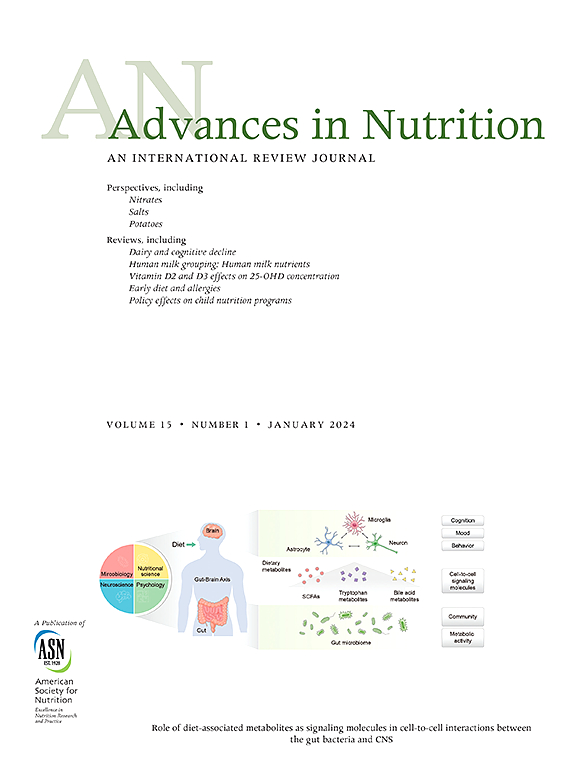Umbrella Review of Systematic Reviews and Meta-analyses on Consumption of Different Food Groups and Risk of All-cause Mortality
IF 9.2
1区 医学
Q1 NUTRITION & DIETETICS
引用次数: 0
Abstract
Consumption of different food groups is linked to a range of health outcomes. It is essential to integrate the most reliable evidence regarding intake of different food groups and risk of mortality to optimize dietary guidance. Our aim is to systematically and comprehensively assess the associations between the consumption of various food groups and all-cause mortality. The food groups under consideration include edible grains (refined and whole grains), fruits, vegetables, nuts, legumes, fish and fish products, eggs, dairy products/milk, meat and meat products (including processed meat, unprocessed red and white meat), sugar-sweetened beverages, and added sugars. We present these associations with high compared with low consumption and per serving comparisons. We comprehensively and systematically reviewed a search in Medline, Embase, Web of Science, and Epistemonikos (PROSPERO: CRD42024498035), identifying 41 meta-analyses involving over a million participants, many of which showed significant heterogeneity. Of the 41 studies, 18 were rated high quality, 8 moderate quality, 5 low quality, and 10 critically low quality according to AMSTAR-2 assessments. Our findings revealed that higher consumption of nuts, whole grains, fruits, vegetables, and fish was associated with lower mortality rates, both in high compared with low comparisons and per serving analyses. Similarly, we observed favorable outcomes for legumes and white meat in high compared with low comparisons. Conversely, high intakes of red and processed meats, as well as sugar-sweetened beverages, were linked to higher all-cause mortality. Dairy products and refined grains did not show clear associations with mortality, whereas there was a tendency in all-cause mortality for high intakes of added sugars and eggs.
对不同食物种类的消费和全因死亡风险的系统评价和荟萃分析的综合综述。
食用不同种类的食物与一系列健康结果有关。整合关于不同食物组摄入量和死亡风险的最可靠证据以优化饮食指导至关重要。我们的目的是系统和全面地评估各种食物的消费和全因死亡率之间的关系。考虑中的食物类别包括可食用谷物(精制谷物和全谷物)、水果、蔬菜、坚果、豆类、鱼和鱼制品、鸡蛋、乳制品/牛奶、肉和肉制品(包括加工肉类、未加工的红肉和白肉)、含糖饮料和添加糖。我们通过高消费量与低消费量以及每份消费量的比较来呈现这些关联。我们全面系统地回顾了Medline、Embase、Web of Science和Epistemonikos (PROSPERO: CRD42024498035)上的搜索,确定了41项meta分析,涉及100多万参与者,其中许多显示出显著的异质性。在41项研究中,根据AMSTAR-2评估,18项为高质量,8项为中等质量,5项为低质量,10项为极低质量。我们的研究结果显示,无论是在高与低比较中,还是在每份分析中,坚果、全谷物、水果、蔬菜和鱼类的高摄入量都与较低的死亡率有关。同样,我们观察到豆类和白肉在高与低比较中的有利结果。相反,大量摄入红肉和加工肉类,以及含糖饮料,与更高的全因死亡率有关。乳制品和精制谷物与死亡率没有明显的联系,而大量摄入添加糖和鸡蛋则有导致全因死亡率的趋势。
本文章由计算机程序翻译,如有差异,请以英文原文为准。
求助全文
约1分钟内获得全文
求助全文
来源期刊

Advances in Nutrition
医学-营养学
CiteScore
17.40
自引率
2.20%
发文量
117
审稿时长
56 days
期刊介绍:
Advances in Nutrition (AN/Adv Nutr) publishes focused reviews on pivotal findings and recent research across all domains relevant to nutritional scientists and biomedical researchers. This encompasses nutrition-related research spanning biochemical, molecular, and genetic studies using experimental animal models, domestic animals, and human subjects. The journal also emphasizes clinical nutrition, epidemiology and public health, and nutrition education. Review articles concentrate on recent progress rather than broad historical developments.
In addition to review articles, AN includes Perspectives, Letters to the Editor, and supplements. Supplement proposals require pre-approval by the editor before submission. The journal features reports and position papers from the American Society for Nutrition, summaries of major government and foundation reports, and Nutrient Information briefs providing crucial details about dietary requirements, food sources, deficiencies, and other essential nutrient information. All submissions with scientific content undergo peer review by the Editors or their designees prior to acceptance for publication.
 求助内容:
求助内容: 应助结果提醒方式:
应助结果提醒方式:


